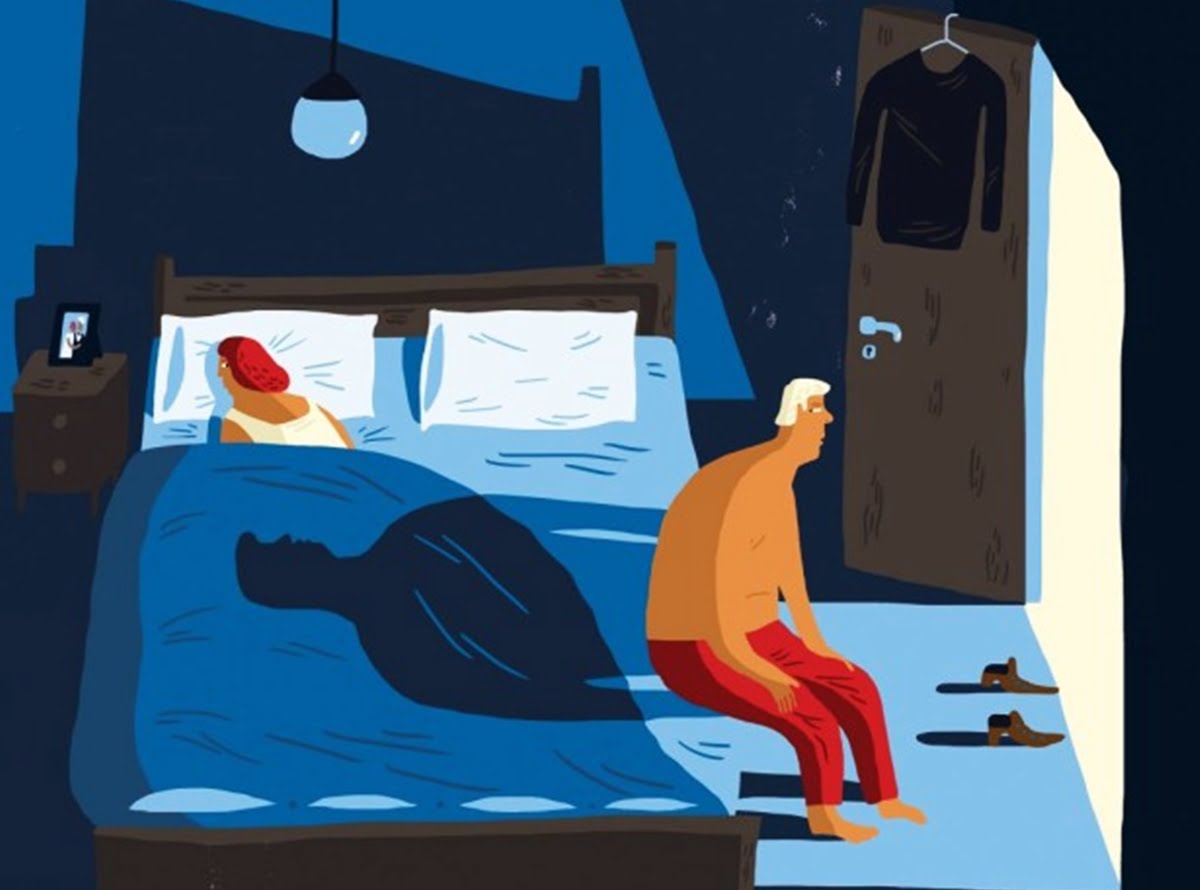It is human instinct to look for love or comfort elsewhere when it is lacking in your own home. When this desire for love overpowers one’s judgment or their willingness to do what is “right”, they might engage themselves in illicit affairs.
People often fool themselves into believing that idealised love is located outside the purview of fidelity, in a space that is just out of their reach. Perhaps, in reality, this idealised love only exists in their imagination or in the thrills of “the forbidden”.
Infidelity as an escape
In a patriarchal society, women often find themselves stuck in unhappy relationships or marriages. Relationships under the purview of monogamy require one to end their sexual or romantic relationship with their partner before getting involved with another partner. However, the paradox of monogamy is that it is deeply rooted within a heteropatriarchal model of relationship that prides itself in its longevity. Women in such relationships hardly ever have enough cultural or social capital or monetary resources to leave. In a society where women are idealised in the image of a pious wife and a sacrificing mother, they feel conditioned to feel that it is their primary role to hold their family together. In such a situation, simply leaving in search of a happier life is unthinkable for many.
Also read: In Conversation With Kaleeswaram Raj: Decriminalising Adultery In India

In 8th, 9th century India, the Bhakti movement had started as a subversive recourse to the oppression of Brahmanical patriarchy on the lives of women and people belonging to the lower spectrum of the caste hierarchy. Women Bhakti poets like Mirabai, Akka Mahadevi, walked out on their husbands because they chose god as their lover. Their poetry stands as a testament to their courage to proudly celebrate and claim agency to who they dedicate their body and spirit.
In Kamala Das’s autobiography My Story, we find that she had no agency when she was married off at the age of 15. The love and the sexual fulfillment that she desired were not met by the man that was chosen for her. So she decided to look for it elsewhere. Even though her extramarital affairs often replicated the structural violence and indignity of her marriage, she at least found agency in the act of “seeking” or “looking” for love elsewhere.
Does infidelity always occur out of helplessness?
It would be reductive to claim that women only commit infidelity out of helplessness. Perhaps, a certain degree of helplessness can be attributed to all adult relationships where the individuals are emotionally invested. Objectively rationalising such relationships is often very difficult. Sometimes infidelity occurs because the people involved choose primacy of emotions rather than self-actualising and introspecting the consequences of their actions. In the end, it is always about looking for something that is missing in one’s own life or relationship.
It is possible to view infidelity as a frustrated response to the limitations of monogamy rather than attaching a moral or social stigma to it. If people were made aware of and conditioned into alternative models of relationships such as open sexual relationships, and polyamory as opposed to monogamy as the norm, they would make more informed and sensitive decisions rather than simply choosing a path of dishonesty.
The Dichotomy of ‘The Other Woman’ and ‘The Left Behind Woman’
According to popular culture, the other woman is a morally corrupt woman who seduces innocent men out of their happy relationships, usually for their gains. Her characterisation often lacks empathy or thoughtful characterisation. On deconstructing the figure of the “other woman”, we find that she resides on the flip side of the same woman who is left behind by her cheating partner. Media stories try to pit these women against each other by playing into the dichotomy of the innocent, desexualised woman who suffers and the morally corrupt, hypersexualised woman who makes her suffer. This binary exempts men from the harsh judgment that is usually reserved for “the other woman”.
Through a feminist lens, it can be argued that “the other woman” is an empowered woman who does not need her love legitimised through the social sanctity of marriage or monogamy. The woman simply acts on her desire and devotes her life in search of romantic and sexual fulfillment in places that are not accessible to her.
Also read: Is Infidelity An Institutional Problem?: Monogamy, Ideal Love And Our Moral Gaze Of Gehraiyaan

In Hindu mythology, Radha dedicates her life to love and devotion for Krishna, without ever being pitted against his many lovers. There is no “other woman”. Only women who celebrate their love in a polycule. Krishna’s Raas Leela is a celebration of the soul and the body where the gopis exercise their agency to love without inhibitions. Similarly, the Baul singers of Bengal celebrate ‘parakiya prem’ or ‘adulterous love’ in their twilight language that is comprehensible to only those who live on the margins of monogamous heteronormativity.
An indication of the flaw within the system
In a monogamous, hetero-patriarchal social structure, adultery enforces a discourse where a failed marriage implies failure on the part of the couples to perform their social and cultural duty. In retrospect, infidelity committed by either of the partners depict a flaw in their interpersonal relationship rather than any flaw in their personhood, per se.
Adultery laws are still enforced in India to protect women from divorces. Perhaps, at a time when women were denied any agency in the society and would have been reduced to the state of destitution had their husbands decided to leave them, a law such as this might have helped them survive.
However, within its socio-cultural context, it can be easily argued that the primary motive of this law is to protect the hetero-patriarchal institution of marriage rather than helping those individuals who feel trapped in it. It penalises those whose actions point out the blatant flaws and inadequacy of the institution of monogamy.
Infidelity is not a social problem, nor is it a crime. It could be an indication that a relationship is no longer functional. Yet, the cultural stigma or the social, and economic compulsions make the individuals pursue a life of dishonesty and falsehood rather than finding a way to acknowledge the reality of it.
Debabratee (she/they) is a student of English Literature at Jadavpur University. When they are not found reading or writing, they are found running after their pet dog and cuddling with him. They are an avid binge-watcher of all kinds of OTT content and like to dissect and analyse them in their free time. They can be found on Instagram.
Featured image source: Altpick.com
About the author(s)
Debabratee (she/they) is a student of English Literature at Jadavpur University. When they are not found reading or writing, they are found running after their pet dog and cuddling with him. They are avid binge-watcher of all kinds of OTT content and like to dissect and analyse them in their free time.





Our society is matriarchal, with mothers-in-law feeling the need to control everyone. Mothers-in-law continuously interfere in the marriages of their adult sons while expecting their daughters-in-law to dress well, have good social skills, keep the house clean, etc. The continuous interference and need to control is suffocating for sons too. It is not always the groom’s mother though. Many times the bride’s mother tries to control her son-in-law.
The worst part is when daughters-in-law become mothers-in-law, they treat their daughters-in-law in exactly the same manner they were treated. The need to control everyone becomes a priority.
As for cheating in marriages, when a man cheats, it is the man’s fault. He is not faithful. However, when a woman cheats, it is still the man’s fault. He isn’t a good husband. Perhaps women need to start taking responsibility for their actions and stop blaming men for all their problems.
This article gives a plethora of excuses for women who are unfaithful. The truth is, there is no marriage in the world which is going to have the same spark in the later years as it did initially. A person cheats to enjoy a variety of sexual pleasure, and it displays greedy, manipulative, deceitful, and immoral behavior. Women today are promiscuous. Even before marriage, women have had multiple boyfriends and many male friends. Narcissists enjoy the validation and attention they get from neighbours, colleagues, boss, gym guy, etc. Countless affairs start as a result. Finding flaws in a husband or marriage is not an excuse to be unfaithful. No human being is perfect. No marriage is perfect. Have respect for your marriage and for the sacredness of sex within marriage.
Women cheat on good husbands. Women cheat because they are bored, selfish, entitled and horny. A man is busy working to provide for his wife and she repays him by cheating behind his back. Women marry men for their high income, luxury car and big house and then they start lusting after young and handsome men, and indulge in extra-marital sex. To justify their behaviour, women point fingers at issues in marriages, without realising that every marriage has its own set of problems.